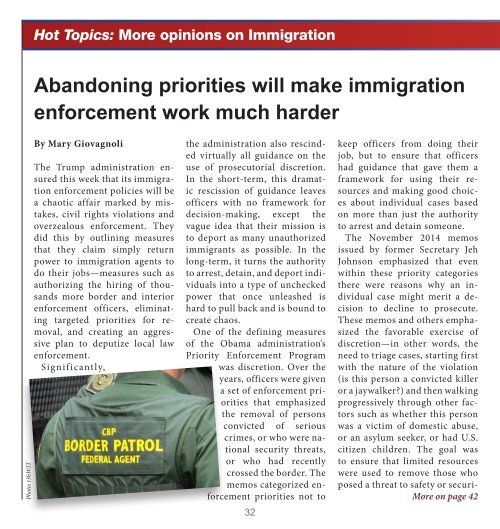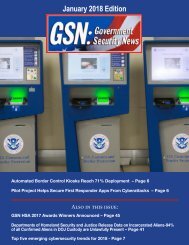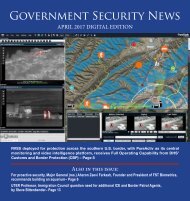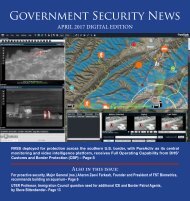Government Security News February 2017 Digital Edition
You also want an ePaper? Increase the reach of your titles
YUMPU automatically turns print PDFs into web optimized ePapers that Google loves.
Hot Topics: More opinions on Immigration<br />
Abandoning priorities will make immigration<br />
enforcement work much harder<br />
Photo: t3hWIT<br />
By Mary Giovagnoli<br />
The Trump administration ensured<br />
this week that its immigration<br />
enforcement policies will be<br />
a chaotic affair marked by mistakes,<br />
civil rights violations and<br />
overzealous enforcement. They<br />
did this by outlining measures<br />
that they claim simply return<br />
power to immigration agents to<br />
do their jobs—measures such as<br />
authorizing the hiring of thousands<br />
more border and interior<br />
enforcement officers, eliminating<br />
targeted priorities for removal,<br />
and creating an aggressive<br />
plan to deputize local law<br />
enforcement.<br />
Significantly,<br />
the administration also rescinded<br />
virtually all guidance on the<br />
use of prosecutorial discretion.<br />
In the short-term, this dramatic<br />
rescission of guidance leaves<br />
officers with no framework for<br />
decision-making, except the<br />
vague idea that their mission is<br />
to deport as many unauthorized<br />
immigrants as possible. In the<br />
long-term, it turns the authority<br />
to arrest, detain, and deport individuals<br />
into a type of unchecked<br />
power that once unleashed is<br />
hard to pull back and is bound to<br />
create chaos.<br />
One of the defining measures<br />
of the Obama administration’s<br />
Priority Enforcement Program<br />
was discretion. Over the<br />
years, officers were given<br />
a set of enforcement priorities<br />
that emphasized<br />
the removal of persons<br />
convicted of serious<br />
crimes, or who were national<br />
security threats,<br />
or who had recently<br />
crossed the border. The<br />
memos categorized enforcement<br />
priorities not to<br />
32<br />
keep officers from doing their<br />
job, but to ensure that officers<br />
had guidance that gave them a<br />
framework for using their resources<br />
and making good choices<br />
about individual cases based<br />
on more than just the authority<br />
to arrest and detain someone.<br />
The November 2014 memos<br />
issued by former Secretary Jeh<br />
Johnson emphasized that even<br />
within these priority categories<br />
there were reasons why an individual<br />
case might merit a decision<br />
to decline to prosecute.<br />
These memos and others emphasized<br />
the favorable exercise of<br />
discretion—in other words, the<br />
need to triage cases, starting first<br />
with the nature of the violation<br />
(is this person a convicted killer<br />
or a jaywalker?) and then walking<br />
progressively through other factors<br />
such as whether this person<br />
was a victim of domestic abuse,<br />
or an asylum seeker, or had U.S.<br />
citizen children. The goal was<br />
to ensure that limited resources<br />
were used to remove those who<br />
posed a threat to safety or securi-<br />
More on page 42















